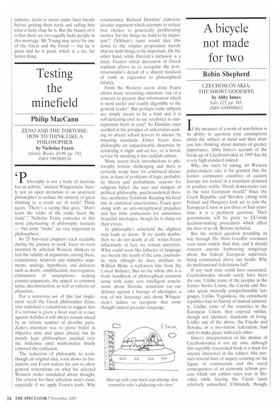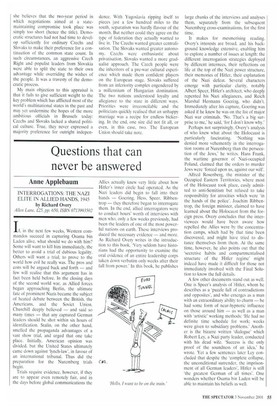A bicycle not made for two
Robin Shepherd
CZECHOSLOVAKIA: THE SHORT GOODBYE by Abby tones Yale, £25, pp. 345, ISBN 0300090633 If the measure of a work of non-fiction is its ability to question your assumptions about the subject at hand and then draw you into thinking about matters of greater importance, Abby Innes's account of the break up of Czechoslovakia in 1993 has hit a very high standard indeed.
Why, she starts by asking, do Western policy-makers take it for granted that the former communist countries of eastern Europe are locked in a transition destined to produce stable, liberal democracies cast in the west European mould? Since the Czech Republic and Slovakia (along with Poland and Hungary) look set to join the European Union in just three or four years' time, it is a pertinent question. Their governments will be party to EU-wide decision-making procedures which affect the lives of us all, Britons included.
But the central question pounding its way through The Short Goodbye resonates even more widely than that, and it should concern anyone harbouring misgivings about the federal European superstate being constructed above our heads: Why do multinational federations fail?
If any such state could have succeeded, Czechoslovakia should surely have been the one. Unlike many of the peoples in the former Soviet Union, the Czechs and Slovaks speak mutually comprehensible languages. Unlike Yugoslavia, the constituent republics had no history of mutual animosity, Unlike some of the countries in the European Union, they enjoyed similar, though not identical, standards of living. Unlike any of the above, the Czechs and Slovaks, in a two-nation federation, had only to make peace with each other.
Innes's interpretation of the demise of Czechoslovakia is not my own, although this superbly researched book is a must for anyone interested in the subject. She pursues several lines of inquiry centring on the legacy of communism and the social consequences of an economic reform process which saw jobless rates soar in Slovakia while leaving the Czech lands relatively untouched. Ultimately, though, she believes that the two-year period in which negotiations aimed at a statemaintaining compromise took place was simply too short (hence the title). Democratic structures had not had time to develop sufficiently for ordinary Czechs and Slovaks to make their preference for a continuation of the common state count. In such circumstances, an aggressive Czech Right and populist leaders from Slovakia were able to split the state to their own advantage while overriding the wishes of the people. It was a travesty of the democratic process.
My main objection to this appraisal is that it fails to give sufficient weight to the key problem which has afflicted most of the world's multinational states in the past and may yet undermine the hopes of the more ambitious officials in Brussels today: Czechs and Slovaks lacked a shared political culture. True, they never expressed a majority preference for outright indepen dence. With Yugoslavia ripping itself to pieces just a few hundred miles to the south, separatism was hardly flavour of the month. But neither could they agree on the type of federation they actually wanted to live in. The Czechs wanted greater centralisation. The Slovaks wanted greater autonomy. Czechs were enthusiastic about privatisation. Slovaks wanted a more gradualist approach. The Czech people were the inheritors of a pre-war cultural experience which made them confident players on the European stage. Slovaks suffered from an inferiority complex engendered by a millennium of Hungarian domination. The two nations understood loyalty and allegiance to the state in different ways. Priorities were irreconcilable and the politicians quickly realised that an unhappy marriage was a recipe for endless bickering. In the end, one size did not fit all, or even, in this case, two. The European Union should take note.



















































































 Previous page
Previous page